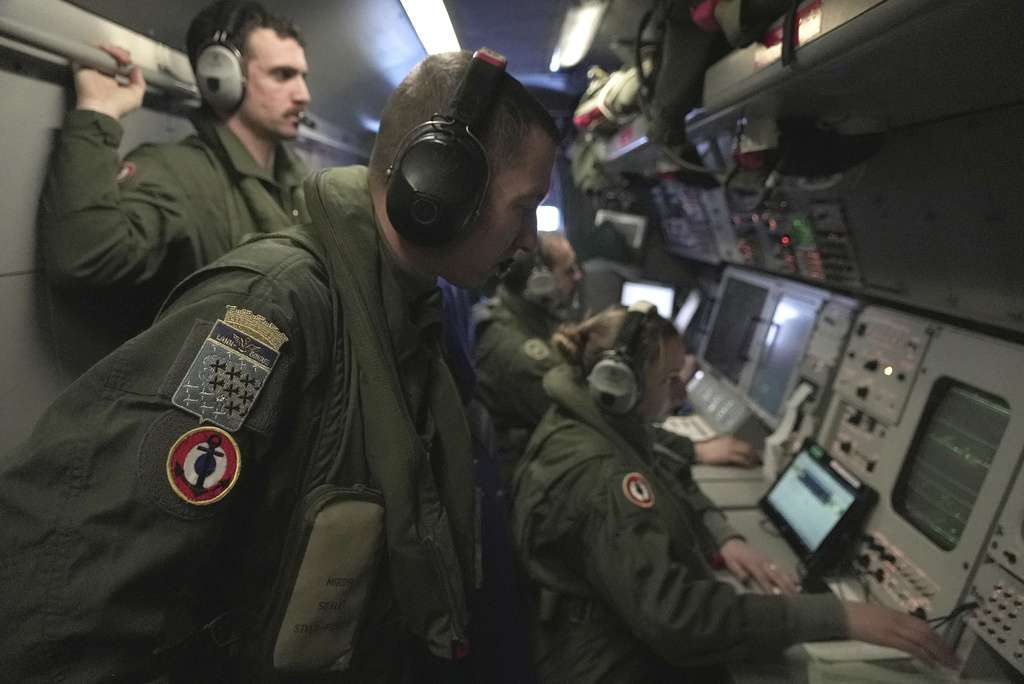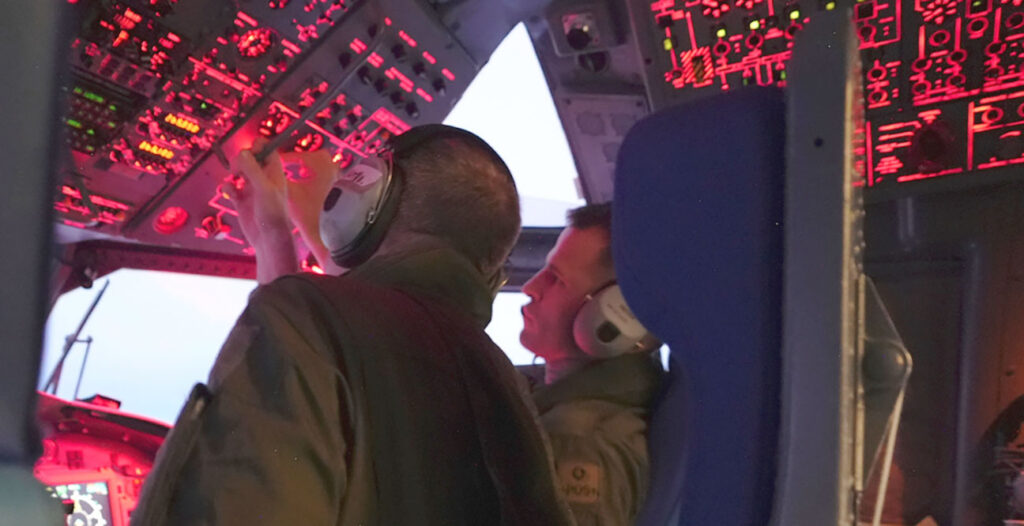The flight deck crew aboard a French Navy Atlantique 2 surveillance plane monitor cockpit instruments as the aircraft patrols over the Baltic Sea in January 2025 as part of NATO’s Baltic Sentry mission. THE ASSOCIATED PRESS
THE WATCH STAFF
Three months after NATO announced Baltic Sentry, a mission to guard undersea communications cables in the Baltic Sea after commercial ships were accused of damaging equipment and a gas pipeline there, no new sabotage has been alleged in the waterway. The incidents had raised fears of Russia creating havoc and spying in the strategic region.
“Across the alliance, we have seen elements of a campaign to destabilize our societies through cyberattacks, assassination attempts and sabotage, including possible sabotage of undersea cables in the Baltic Sea,” NATO Secretary-General Mark Rutte said in January when Baltic Sentry was announced. “We will do everything in our power to make sure that we fight back, that we are able to see what is happening, and then take the next steps to make sure that it doesn’t happen again. And our adversaries should know this.”
Baltic Sentry targets the potential sabotage of undersea cables as part of this so-called “hybrid warfare” to destabilize European nations helping Ukraine in its war with Moscow. Without specifically blaming Russia, Rutte said: “Hybrid means sabotage. Hybrid means cyberattacks. Hybrid means sometimes even assassination attacks, attempts, and in this case, it means hitting on our critical undersea infrastructure.”
Allies leading Baltic Sentry use frigates, maritime patrol aircraft and a fleet of naval drones for surveillance and deterrence.
On a patrol flight in March, a long-range French Navy Atlantique 2 with a high-resolution camera and other advanced surveillance gear searched the Baltic Sea for potential saboteurs. The patrol’s purpose was not just observing but also being observed. “We are to show that we are here,” Romain, a lieutenant commander and a member of the plane’s crew, told The New York Times. He spoke on condition that only his first name and rank be used, per French military rules.
Later during that patrol, Russian forces tried to jam the Atlantique’s GPS. Another Russian navy ship locked on to the plane with radar. That could mean they were ready to open fire, or more likely, it was an attempt to gauge the plane’s altitude. Russian navy ships and a submarine could be seen in the sea below.

The French military strongly objected to the radar lock-on. “This intimidation is part of unnecessarily aggressive actions hindering freedom of navigation,” the French military’s Joint Staff posted on X.
On another French Atlantique patrol in January, the crew cross-checked ships they spotted against lists of vessels they had been ordered to observe. “If we witness some suspicious activities … for example, ships at very low speed or at anchorage in a position that they shouldn’t be at this time — so this is something we can see,” the flight commander, Lt. Alban, told The Associated Press. “We can have a very close look with our sensors to see what is happening.”
Baltic Sentry relies mostly on NATO members with Baltic coastlines, like Finland, Poland and Sweden, but the British and the French also execute patrols, along with U.S. Marines in Finland. Though the mission is not directed against any specific nation, the focus of patrols has clearly been on Russia. The Kremlin, however, have called accusations that Russia has led a sabotage campaign in the Baltic Sea “absurd.”
“It’s a touchy situation,” Romain told The New York Times. The French patrols aren’t trying to provoke the Russians, Romain said, but things can escalate. Each Atlantique crew member is issued a parachute as a precaution.
Since the start of Baltic Sentry, no more cases of suspected sabotage have been reported in the region, but officials acknowledge that the mission is still in its early days. “We should keep in mind that Russia is not omnipotent; it can’t do everything,” Juha Martelius, Finland’s intelligence chief, said in January. “But it can do a lot, and therefore it’s important for us both nationally and in international cooperation to be vigilant about what happens in the Baltic Sea.”

